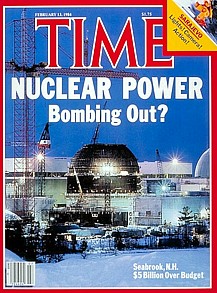Wonder why Southern Company couldn’t get private financing for its new nukes at Plant Vogtle? Because back in June 2009 bond-rater Moody’s said this:
But from a credit perspective, the risks of building new nuclear generation
are hard to ignore, entailing significantly higher business and operating risk profiles, with construction risk, huge capital costs, and continual shifts in national energy policy.
In case that wasn’t clear enough, they spelled it out further.
Nuclear’s “bet-the-farm” risk
The NRC says about 14 companies to date have submitted COL applications, proposing numerous new nuclear reactors for power generation. The first of these COL’s is expected to be approved beginning in mid-2011. Many of the COL license applications include partners, but the next table lists the primary holding company entity behind each project, and our view of the activity level associated with the endeavor.
From a credit perspective, companies that pursue new nuclear generation will take on a higher business and operating risk profile, pressuring credit ratings over the intermediate- to long-term.
Moody’s wraps up with some reassuring words for financiers, but maybe not so reassuring to we the taxpayers:
Continue reading









